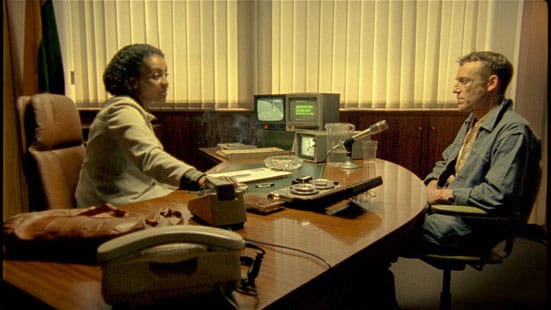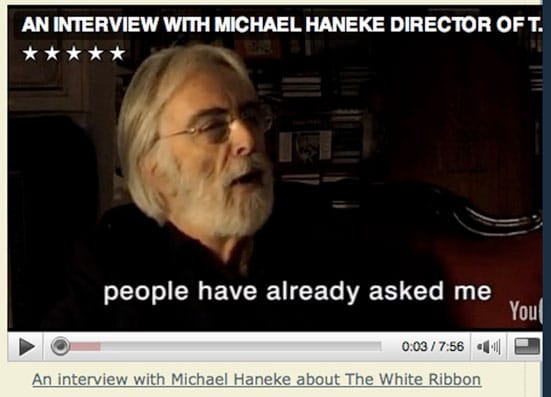8th October 2009 — 6th December 2009
Omer Fast's video installation at South London Gallery comes at a time when the air is filled with talk of the Austrian director, Michael Haneke – his film 'The White Ribbon' having just been released. In their respective mediums, they seem to share some preoccupations.
Fast's installation, 'Nostalgia', consists of three video elements which unpack from each other like Russian dolls – only starting with the smallest and discovering, with each layer removed, a larger, more fully-grown thing within. The first is a short video on a small monitor directly opposite the gallery doorway, showing a white man wearing camouflaged clothes in English-looking woodland, building a trap. The construction is described by an African-accented narration. When the trap is completed, we cut to a shot inside a studio, where a black man is putting the finishing touches to the same trap, in front of a green screen backdrop – he face out of shot.
Skirting round the first monitor, we enter black space and eventually rest upon a double projection, again, shot in a studio. Each projection shows a man's head and shoulders – one an actor playing the role of an interviewer (the interviewer being the artist, we infer) and the other the interviewee, who tells of his experiences as a child soldier and eventually repeats the directions on how to make the same trap, described both as a trap for partridges, and then also a trap for (less acceptably) monkeys. The story told to the interviewer changes in the telling, starting as (palpably) exactly what the interviewer is looking for – romantic tales of a boy and his father in the jungle, ingeniously trapping birds for food – to something muddier and more problematic – trapping monkeys to sell to tourists, or failing that, to soldiers.
Michael Haneke displays what Thomas Elsaesser describes as 'performative contradiction' – performative in that Haneke himself plays a part, the part of the director Michael Heneke , in the production of the effect of the film, and contradictory because to fulfil this role, to make the film, he must act in opposition to the ideas he wants to communicate. Famously stating that cinema is 'lies at twenty-four frames a second', Haneke frequently casts himself as cinematic trickster, manipulator and malevolent God of his film-world. There is also something sadistic about Fast as creator; we feel he is toying with us, constantly pulling the rug from beneath us – there is no solid moral ground from which to unpick the work. For example, in the double channel video piece described above the interview is obviously being performed by actors, whose words come from a script, albeit one that is believable as a transcription. The role of the usually supposedly neutral role of the interviewer, who wishes to extract the facts from a traumatised person, who in this case has escaped a life as a child soldier in Africa to seek asylum in the UK, is confused with that of the casting director, who is looking for something very specific to fulfil part or their own project. On top of this, both roles are elided with that of the artist, tabling a kind of potential cynicism possibly inherent within the whole piece, inside which the viewer stands. We are given access to neither the original material, (or at least, not in the form we expect – in the first piece we may have the sound of an original interview, and in the accompanying publication, we have a typed transcript of an interview), nor quite enough information to gage the situation (what war, which African country?) This sense of manipulation is enhanced by the ingenious use of multiple projections and different video technologies – we never know what is going to be around the corner.
After a little more wandering in the dark, we find the final instalment of 'Nostalgia' – a 30minute sci-fi film, projected very large, with powerful sound system – as close to a cinema experience as is likely to come our way in a gallery. Sometime in the future, or a past idea of the future (the film is in the style of an older science fiction), Europe has become a wasteland, where inhabitants of Surrey and Reading eek out an existence, occasionally hunted down by Africans on safari. Again, an interview becomes the centre-piece of the film – an English illegal immigrant is questioned by an African official as to his route out of Europe. He is offered a job as a cleaner, in exchange for information on secret tunnels into Africa. Again, there is a given answer from the interviewee, and a desired answer extracted by the interviewer.
This segment of the show, although impressive in its weaving of motifs, styles and genre clichés (and extremely ambitious in terms of production) is slightly disappointing after the economy of the previous two, and perhaps strays into the realm of cliché itself.
Haneke has made it known that his latest film, 'The White Ribbon' was shot with Romanian extras as German peasants, because these were the only people he could find that looked peasant –like. For a film set in the (relatively) recent past, Haneke has the look of mediated history – black and white film. He has said in interview that he can only believe in period films if they correspond to the bank of black and white documentation of the period that he has in his mind – that is, if it corresponds to a lie. In Fast's work from 2003, 'Spielberg's List', accounts from survivors of the holocaust and accounts from extras on the film 'Schindler's List' (Steven Spielberg, 1993) become confused – real atrocity becomes one with the image of atrocity, as Hollywood overwrites the holocaust. Fast's position in such work is not judicial – he draws attention to a problem by adding emphasis.
Both Haneke and Fast capitalise on both giving and denying us what we want. Haneke, in films such as 'Funny Games' (Austrian in 1997 and US in 2007) gives us the horrific, violent 'pay-off' we require from a film operating within the thriller or crime genre, but denies us the pleasure of it by making us feel extremely uncomfortable in our consumption of such images – the film image looks out at us and asks us if this is really what we want, or need, or have a right to see. Fast operates within a comfortably respectable genre of contemporary art – films and videos that ostensibly deal with 'issues' – race, war, suicide bombing, the holocaust – but in such a way that what becomes the central issues is the mediation of such subjects within work like his; his own role as storyteller, illusionist, deceiver and perhaps self-deceiver, and therefore our role as the expectant audience.
Michael Haneke's 'The White Ribbon' is in cinemas now
Also in this month's artvehicle, see Ed Atkin's Aside on Michael Haneke's 'The White Ribbon'
Richard Whitby
South London Gallery
65 Peckham Road
London SE5 8UH
http://www.southlondongallery.org
Open
Tuesday-Sunday, 12-6pm

Omer Fast, Nostalgia, 2009, production still. Photos- Thierry Bal Courtesy gb Agency, Paris Postmasters, New York and Arratia, Beer, Berlin

Screen-grab of an interview with Michael Haneke, available on filmstudiesforfree blog